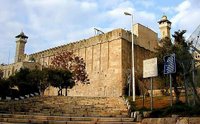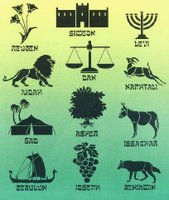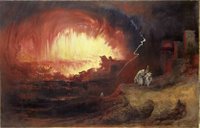Thought of the Week - Toldot
B''H
Thought of the Week

Hello to all once again. Thank G-d this is the 3rd week of the Thought of the Week, and it seems to be getting good feedback. I would like to try something new called the weekly good deed. Every week I’ll connect one good deed to the Torah Portion of that specific week. We’ll all try to perform that good deed to the best of our ability, until the next week for the newer good deed. Don’t worry, I guarantee it’ll be simple ones (for those of you who are starting to get all worried). Feel free to email me if you have any questions.
This weeks’ portion is Toldot. Toldot talks about Isaac and Rebecca’s chronicles.
The portion starts by telling us that Rebecca was sterile. (There were several Kabalistic reasons for this, which we will not get into - for more info on this feel free to ask). The Torah then tells us of how Isaac and Rebecca went to Mount Moriah to pray for children. Isaac was on one side while Rebecca was standing on the other. The Torah then says that G-d answered Isaac’s prayers.
The commentator Rashi comments:
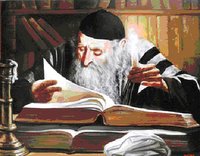
‘Usually a woman’s prayer is answered before her husbands, but this case is different. This is because the prayer of a saint who is the son of a saint (in this case Isaac) cannot be compared to the prayer of a saint, who is the child of a wicked person (in this case Rebecca.) However you must remember that Rebecca did not have to change her name. (Unlike Sara which was changed from Sarai.) Rebecca was surrounded by wicked people, nonetheless she remained a saint. Therefore she was rewarded by not having to change her name.’
Thus she conceived twins - 2 boys.
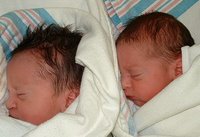
We mentioned that a woman’s prayer is normally answered first. The following story will clarify this.
There was once a saint in the time of the Talmud named Abba Chelkiah. He was the Grandson of the famous Choni Ha Me’aggol. (Just a short note about his story, Choni was during the time of a drought. He brought rain by drawing a circle on the ground and standing inside of it, promising that he will not leave until rain comes. Evidently, it rained. (Hence the name Ha Me’aggol/The Circle Drawer.)
Abba Chelkiah was considered a very great saint. In times of drought the sages would come to his house and ask him to pray. It would usually begin to rain even before they left his house!
One year there was an extremely severe drought. A number of sages came to his house asking him to pray. Not finding him at home they went to look for him in the field where they found him working. When they greeted him however, not only did he not return the greeting, he did not even look up at them.
With no choice the sages remained in the field all day waiting for him to complete his work.
On the way home Abba Chelkiah did a number of strange things. He was very poor and had to carry a load of wood home.

He placed the wood on one shoulder, and his cloak on the other. All the way he walked barefoot but when he had to cross the stream he put them on only to take them off again as soon as he was on the other side. When he came to a place where there were brambles, he lifted his tunic placing its corners on his shoulders.
Upon arriving home, his wife beautifully made up, came out to greet him. He allowed his wife to enter the house first and he followed her. Although the sages were accompanying them, he did not show them any honor, nor did he invite them in. Knowing his good ways, however, they followed him into the house on their own.
Sitting down with his wife and 2 sons, Abba Chelkiah did not invite the other sages to join the meal, as good manners would normally dictate. He divided the bread into 3 portions, giving one to the older son and 2 to the younger.
After the meal, he whispered to his wife. “It seems that the sages of Israel have come to me because of the current drought. Let us go up on the roof as if we didn’t want to be involved, and there we will pray. Perhaps it will be a time of divine favor and rain will come tonight. Let them not know that it was because of our prayers, they have not yet said a word to me as to why they came.”
Climbing the stairs to the flat roof of their house, Abba Chelkiah stood on one side and his wife on the other. So they began to pray. Surely enough it became cloudy, however it was on his wife’s side. On his side it was clear and full of stars with no single evidence of cloud.
Abba Chelkiah then came down and began to converse with the sages making them most welcome. “Why did you come?” He asked.
“Master” they replied. “You must know the greatest sages have sent us to you to pray for rain. They knew that you’re prayers are rapidly accepted.”
“But look! Even as we speak it is beginning to rain. May G-d’s name be blessed! He has had mercy on his world and you no longer need my prayers”
“You cannot fool us master. There is little question in our minds that your prayers brought this rain. As soon as you left us you must’ve prayed. May G-d reward you! But before we leave we would like to ask you some questions about the strange manner you conducted yourself today.”
“Ask and I will explain.” Abba Chelkiah replied.
“When we greeted you, why did you not return our greeting?”
“I was working and being paid by the day, it was therefore forbidden for me to put down my work and speak to others even for a moment.”
They then asked him about his strange actions on the way home. He told them that the reason for putting his cloak on his shoulder was because it was not given to him to use as a pad under his wood, but he borrowed it in order to look decent when walking amongst people.
They also questioned him about his strange ways when he crossed the stream. He told them:
“On the road I can see where I’m going, I don’t have to wear out my good shoes, but in the water I must wear them since I can’t see where I’m going and I might step on something harmful”

They were also confused about the fact that he did not leave his tunic down to protect his legs. They were wondering why he had to lift it up. Abba Chelkiah explained that his legs can heal, however a torn tunic does not heal itself.
They then asked him about his strange actions upon arriving at his house. His wife was all dressed up, and she also entered the house first Abba Chelkiah following, leaving the scholars outside.
“A man must be careful not to look at a woman other than his wife. Such a glance may be harmful. Since there are several families in the courtyard I want my wife to look so beautiful that I’ll want to look only at her. As for my wife going in first, I didn’t know you and couldn’t assume you to be virtuous. Therefore I didn’t want my wife to remain alone with you in the house. This is the reason I went in after her.”
“Why didn’t you invite us to partake in your meal?”
“There wasn’t enough food for all of us. One should not invite others when there isn’t enough. It is considered misrepresentation.”
“Why did you give a single piece of bread to the elder son and 2 to the younger?”
“The younger studies all day and needs the strength whilst the older is at home all day and can eat as much as he wants.”
He explained that it was for 2 reasons that the clouds came on his wife’s side rather than his.
“It is because of her charitable deeds. When a woman gives alms it is on a much higher level than those given by her husband. Firstly she is usually at home. When a poor person comes she he never leaves him empty handed. The man however is in his business, and its very difficult for the poor person to reach him, furthermore, if the poor man is hungry, the wife gives him a piece of bread satisfying him right away. However a man usually can only give money and the poor person must go to the trouble of buying bread himself. Sometimes he could die of hunger while seeking to buy bread and then too late.
“My wife,” continued Abba Chelkiah has another merit; we had really terrible neighbors who did acts of immorality. I prayed they die whilst she prayed they change their ways for the better. This eventually brought them to repent and improve. For all these reasons the clouds came on her side.
After reading this story we see the great merit of charity and prayer comes hand in hand. Note that the Rebbe, Reb Menachem Mendel Schneerson used to stand hours at a time, every Sunday giving out dollars for charity. He always used to say,“charity hastens the coming of the redemption.” It says in the Talmud, “charity saves from death.” Please add in charity at least for this week. Please give everyday (except Shabbat (Friday night and Saturday till nightfall) and double on Friday) to any charity fund. And remember you make the difference.
©Yermi Kurkus - thought of the week
Derived mainly from Meamloez – Talmud - and the teachings of the Rebbe.
